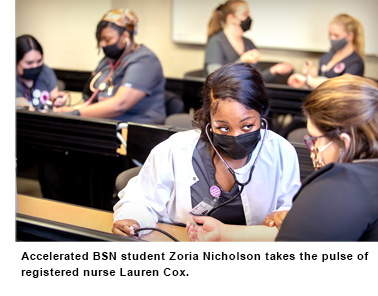UMMC 2025: Education, Research Set New Goals
Good morning!
As we approach the start of a new fiscal year, I want to update you on our UMMC 2025 strategic plan. The roadmap for future growth and development of our tripartite mission heads into the second year of this five-year plan, and it’s important that we evaluate our work toward achieving our strategies and adjust as needed.
We set new goals annually for our five main strategies:
- Maximizing value in quality of care
- Driving strategic clinical growth
- Expanding health care services statewide
- Positioning academic programs for the next generation of learners
- Strengthening research programs
Today I want to focus on education and research – two significant mission areas for transformation of health care in Mississippi.
For our education mission, Dr. Scott Rodgers, associate vice chancellor for academic affairs, has led the development of an ambitious plan for academic programs over the next year with an overall theme of faculty and student success.
 Training the future health care providers for our state is our core responsibility but one we do with great pride. To ensure we have the best faculty, we must provide every opportunity for them to grow and thrive in their careers. We must also have well-supported students who are prepared for their professions. Over the next year, we will have focused efforts in both of these areas.
Training the future health care providers for our state is our core responsibility but one we do with great pride. To ensure we have the best faculty, we must provide every opportunity for them to grow and thrive in their careers. We must also have well-supported students who are prepared for their professions. Over the next year, we will have focused efforts in both of these areas.
We will establish the Academy for Excellence in Education, aimed at enhancing the learning environment of all professional schools through support and recognition of outstanding educators, developing a community of dedicated faculty, and promoting educational excellence, innovation, leadership and scholarship.
Programs for student and faculty success also will be created within the Office of Academic Affairs to benefit all schools. For students, the programming will involve career advisement, study skills, tutoring, writing skills and professionalism coaching, and students will be able to engage with learning opportunities through podcasts, webinars, social media and in-person events. For faculty, the focus will be on mentoring, leadership, professional development and resilience enhancement, also using a variety of approaches to reach the 1,200 faculty on campus from across the seven schools.
In addition, the Office of Academic Affairs is exploring a “visual identity” project, with the goal of showcasing the essence of the student experience at UMMC, while also telling the story of UMMC’s history within the health sciences for the state of Mississippi. This branding and marketing exercise can be helpful t in recruiting students, faculty and researchers to our campus, and it will strengthen school spirit and interprofessional connection.
I want to thank Dr. Rodgers for his thoughtful planning and leadership on ways to enhance our education programming and professional development.
Strengthening our research programs remains an important strategy. As I recently wrote, UMMC’s research enterprise has grown exponentially over the last five years, and we want to build on that momentum. This can be done in several ways as Dr. Richard Summers, associate vice chancellor for research, outlined in the next year’s goals.
First, we will build on the work done this last year in our basic science departments in the School of Medicine and establish external funding expectations in all non-basic science areas. Research faculty, outside of the basic science departments, will learn more about this goal in the coming weeks as we work to set funding expectations that will go in effect in fiscal 2024.
We will optimize translational research in focus areas through the formation and implementation of health-aligned research teams. These collaborative teams will include basic science, translational/population health and clinical representatives in focus research areas. Key external affiliates will be included as needed.
Finally, in an effort to attract and retain future research leaders, we plan to identify succession and faculty composite gaps in research focus areas. Also, we will identify barriers to clinical trial recruitment and revenue recognition by the end of this fiscal year so that we can address and overcome these barriers in fiscal 2024.
As Dr. Summers prepares to retire in July, I am grateful for his ongoing efforts in making sure the research enterprise continues on its path of achievement. He and the dedicated researchers and staff at the Medical Center have raised the bar in funding and research projects over the years. I thank them for their hard work.
These new goals are bold but achievable, and our faculty and students – current and future – will benefit from these innovative plans. I look forward to seeing them come to fruition as we continue our mission toward A Healthier Mississippi.



